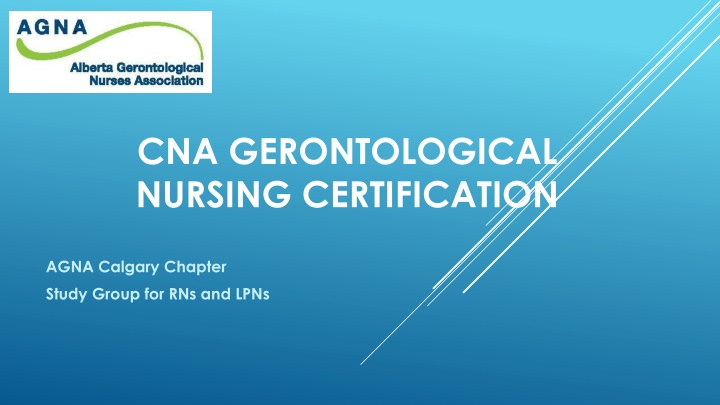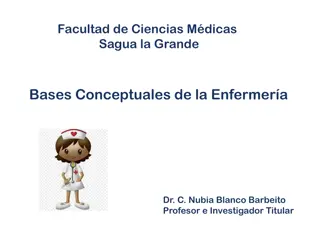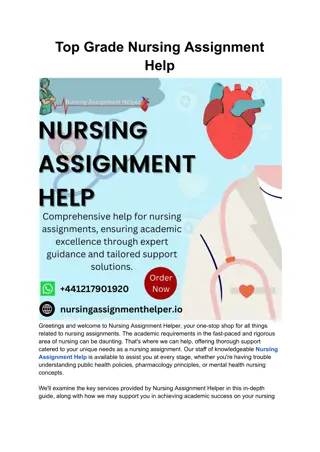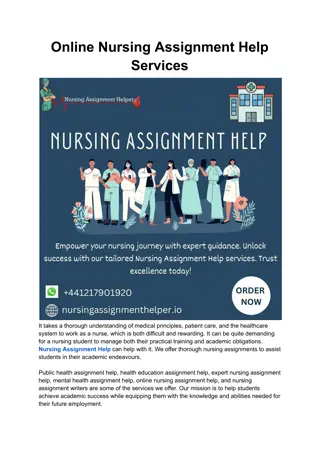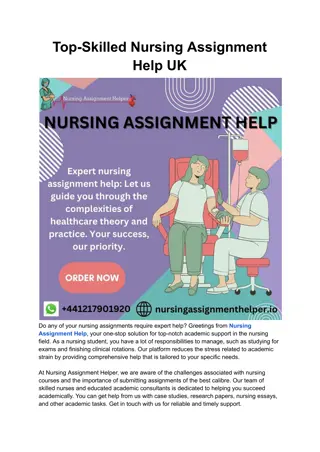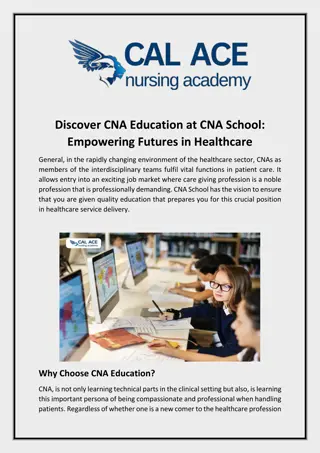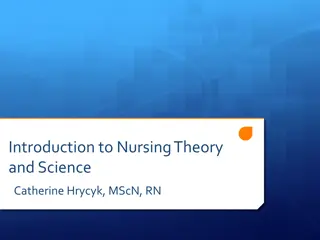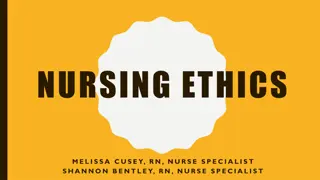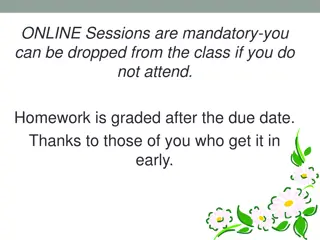CNA Gerontological Nursing Certification
CNA Gerontological Nursing Certification is a prestigious credential for RNs, NPs, LPNs, and RPNs to demonstrate specialized knowledge in gerontology. The certification program offers 22 nursing practice specialties, including Gerontological Nurse Certified (GNC) and Gerontology Practical Nurse Certified (GPNC). Certification renewal and exam details, new accessibility requirements, financial support resources, and application processes are covered in this comprehensive guide. Nurses can benefit from financial assistance, study groups, and continuing education grants to enhance their professional development and patient care.
Download Presentation

Please find below an Image/Link to download the presentation.
The content on the website is provided AS IS for your information and personal use only. It may not be sold, licensed, or shared on other websites without obtaining consent from the author.If you encounter any issues during the download, it is possible that the publisher has removed the file from their server.
You are allowed to download the files provided on this website for personal or commercial use, subject to the condition that they are used lawfully. All files are the property of their respective owners.
The content on the website is provided AS IS for your information and personal use only. It may not be sold, licensed, or shared on other websites without obtaining consent from the author.
E N D
Presentation Transcript
CNA GERONTOLOGICAL NURSING CERTIFICATION AGNA Calgary Chapter Study Group for RNs and LPNs
CNA Certification WHAT IS CERTIFICATION? - CANADIAN NURSES ASSOCIATION (CNA- AIIC.CA) What is certification? CNA certification is a nationally recognized nursing specialty credential for nurses (RNs, NPs, LPNs, & RPNs). The certification program consists of 22 nursing practice specialties Gerontology is one of them. GNC(C): Gerontological Nurse Certified (C)anada GPNC(C): Gerontology Practical Nurse Certified (C)anada Why certification? Certification is a great way to demonstrate your continuing competence in your nursing specialty. Today more than 13,000 nurses are CNA certified. Be recognized for your commitment to lifelong learning, patient advocacy, and professional practice. Certification has been valued increasingly by employers because their certification demonstrates specialized knowledge and brings many benefits to patients and organizations. Viewed as having enhanced professional credibility. CNA SPECIALTIES HTTPS://WWW.CNA-AIIC.CA/EN/CERTIFICATION/INITIAL- CERTIFICATION/CERTIFICATION-NURSING-PRACTICE-SPECIALTIES
To write the exam You must write the exam to become certified for the first time (also known as initial certification) You can rewrite the exam to renew your specialty certification, but most nurses renew by continuous learning. Important Dates 2023 Fall Exams Apply from June 5 September 30 Exam writing window: November 1 15 Receive your results in December Deadline to apply: Exam dates IMPORTANT DATES - CANADIAN NURSES ASSOCIATION (CNA-AIIC.CA)
New requirements to make certification more accessible Certification is made more accessible to nurses; this is to match changes in nursing curriculums and practice. The eligibility specialty experience hours required for application of the certification is reduced. Two options 1. 1,950 hours of experience in your nursing specialty within the last 5 years (formerly, 3,900 hours). OR 2. 1,000 hours of experience in your nursing specialty within the last 5 years plus 300 hours of formal education, which can be a specialty post-basic course or program at a college/university (as opposed to the former 2,925 hours of specialty experience plus education). Application Process: https://www.cna-aiic.ca/en/certification/initial- certification/application-process
Financial Support Contact AGNA (us!): reimburses for Calgary study group members (a total of $1,500) 2 RNs for their initial certification ($300/person) 2 RNs for their re-cert ($150/person) 2 LPNs for their initial certification ($300/person) Check with your employers: You may want to look into the possibility of financial support from your employer. If your employer is funding your certification, be sure to submit the total amount of your online application. CGNA/AGNA members save on the certification webinars, including a 20% voucher for writing a CNA certification exam or renewing your certification! https://cgna.net/study-groups Alberta Registered Nurses Educational Trust (ARNET): Continuing Education Grants provide partial funding for self-paid educational activities. You must be an RN or NP residing in Alberta. The exam must be completed before applying. Proof of completion (such as exam result and receipts) is required. https://arnet.ca/apply Canadian Nurses Foundation (CNF): provides full reimbursements for CNA nursing specialty certification and renewal exams. Successful completion of the exam must be completed within the year of application. https://cnf-fiic.ca/awards/
Exam Preparation The certification exam is designed to evaluate the knowledge and skills expected of a nurse with experience in a given specialty. The exam will test you on national standards created by nursing experts. CGNA Standards of Practice and Competencies (4th edition, 2020) https://cgna.net/standards Study Resources: https://www.cna-aiic.ca/en/certification/exam-preparation Exam competencies and blueprints General competencies Bibliographies Specialty associations Mentors Study groups Tips and tricks Online practice questions E-book library AHS KRS (Knowledge Resource Service) AHS employees
Exam Blueprints for LPNs and RNs -RNs BLUEPRINT FOR RNS -LPNs BLUEPRINT FOR LPNS HTTPS://WWW.CNA- AIIC.CA/EN/CERTIFICATION/EXAM- PREPARATION/EXAM-COMPETENCIES-AND- BLUEPRINTS
Bibliographies for LPNs and RNs
ARCHIVED WEBINARS AVAILABLE ON CGNA GERONTOLOGICAL NURSING CERTIFICATION EXAM RESOURCES WINTER 2021 (WILDAPRICOT.ORG)
Study Group (Unavailable in Fall 2023) 1 1.5 hours per week for 8 weeks Weekly topics Week 1: Study tips and tricks Week 2: Sexuality & Aging; pain management; sensory changes; cardiovascular disorders Week 3: Promoting healthy skin and feet; respiratory disorders; 3Ds Week 4: Age-related changes; nutrition; ageism; diabetes Week 5: Continence care; medication management; stroke Week 6: Ethics; bone, joint health; frailty & fall prevention Week 7: Rest, sleep & activity; chronic illnesses and health promotion; economic & legal issues Week 8: Social, psychological, spiritual, and cognitive aspects of aging; cancer; loss, death, & palliative care Each week, practice exam questions will be reviewed (approx. 10/week)
Study Group Format: Teach & Learn experiential learning Each person will pick and explore a topic and share important points and learning either via word document/PowerPoint Presentation/case study format (you can be creative). The rest of the group will bring questions regarding the topic. Why do we like teach & learn? When engaged in active learning methods (teaching and learning, small group discussions, and sharing stories), our retention rate increases significantly Activities can also keep us more energized and make learning experiential! (Less boring!) We get to share our unique experiences as we work in various roles across different care settings and acquire indirect experiential learning.
CONTACT: AGNA STUDY GROUP FACILITATORS (JASMINE & ILAVARASHI) AGNA.CALGARY@GMAIL.COM
